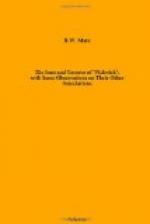Coaches from the same inn served Exeter, Salisbury, Blandford, Dorchester and Bridport; Hastings and Tunbridge Wells; Cambridge, Cheltenham, Dover, Norwich and Portsmouth. It was from here that the historic “Comet” and “Regent” to Brighton and the “Tally Ho” for Birmingham set. out on their journeys, and although the “Golden Cross” which stands to-day cannot boast the glory of the old days of the coaching era, it is still a busy centre, situated as it is in the very heart of London opposite one of its busiest railway termini.
To-day new Dickensian associations circle round it, for on certain days during the summer months motor coaches, chartered by the Dickens Fellowship, make this the starting point for their pilgrimages into Dickens-land, often taking the route the Pickwickians did, as recorded in their chronicles.
CHAPTER III
The “Bull,” Rochester,
“Wright’s next house”
And the “Blue lion,”
Muggleton
To the accompaniment of the “stranger’s” breathless eloquence, the Pickwickians’ first journey from London passed with no untoward adventure. Although the “Commodore” coach stopped occasionally to change horses and incidentally to refresh the passengers, no mention of an inn by name or any other designation is made, however, until The Bull Inn in the High Street, Rochester, is reached.
“Do you remain here, sir? “enquired Nathaniel Winkle of the “stranger.”
“Here—not I—but you’d better—good house—nice beds—Wright’s next house, dear—very dear—half a crown in the bill if you look at the waiter—charge you more if you dine at a friend’s than they would if you dined in the coffee room—rum fellows—very.”
After consultation with his friends Mr. Pickwick invited the “stranger” to dine with them, which he accepted with alacrity.
“Great pleasure—not presume to dictate, but boiled fowl and mushrooms—capital thing! What time?”
The hour being arranged they parted for the time being.
Dickens knew his Rochester well, even in the days when he was writing Pickwick—a knowledge gained doubtless when a lad at Chatham, and Jingle’s reference to “Wright’s next house” is evidence of this, for there was such an hotel at the time, the owner’s name of which was Wright. It was a few doors away, but was actually the next public-house, which, of course, was what was meant.
Its original name was the “Crown,” but in 1836 the said Wright, on becoming proprietor, altered the name it then bore to that of his own. He also changed its appearance to suit his own fancies. In the earlier days it was a typical coaching inn, and had the reputation of once having been favoured with a visit of Queen Elizabeth, as well of Hogarth and his friends. It claimed to have been built in 1390, and was then owned by Simon Potyn, who was several times member of Parliament for the city.




